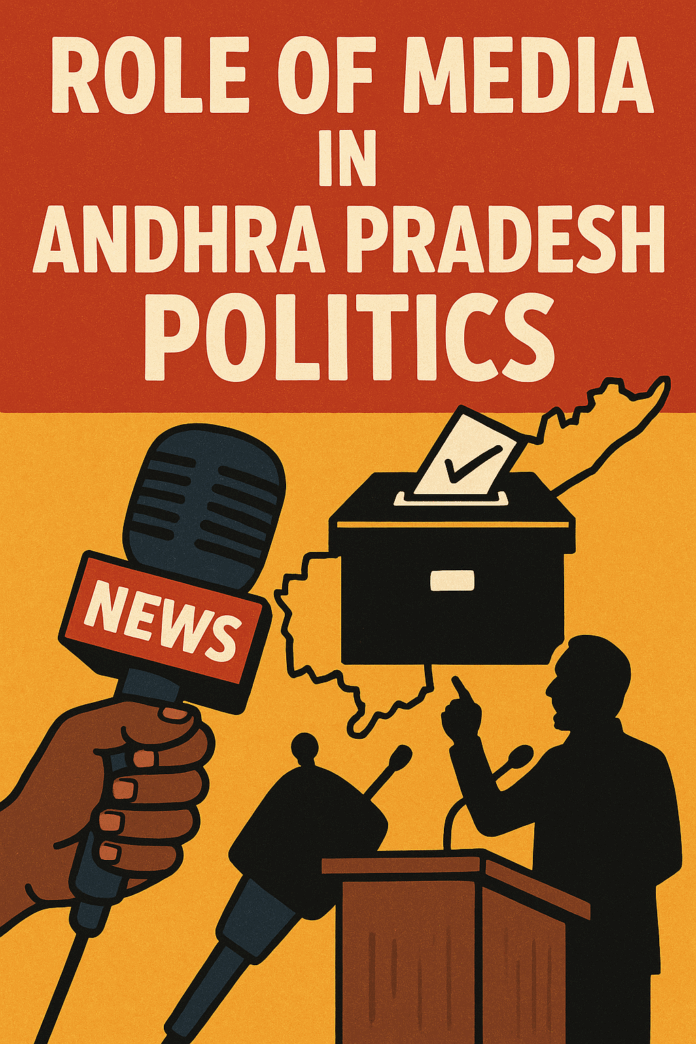🏛Role of Media in Andhra Pradesh Politics
Andhra Pradesh, known for its vibrant and charged political landscape, is a state where media and politics are deeply intertwined. From television debates to digital exposés, the media plays a crucial role in shaping public opinion, influencing voter behavior, and holding power to account. However, this role is not without challenges especially in a state where many media houses are owned or backed by political interests.
🗳 Influencing Voter Behavior
In Andhra Pradesh, where elections are closely contested and political awareness is high, media plays a pivotal role in shaping voters’ perceptions.
- News coverage of party campaigns, rallies, manifesto promises, and press conferences are consumed by millions through television, newspapers, and now increasingly on YouTube and social media.
- During election seasons, prime-time debates and panel discussions on local news channels often sway public sentiment.
- Rural and urban voters alike rely on vernacular Telugu media to understand political developments, compare leaders, and decide their votes.
🎯 Media as a Political Tool
One of the unique aspects of Andhra Pradesh’s media ecosystem is the direct ownership or control of major media outlets by political entities or influential individuals with strong political affiliations.
- For instance, Sakshi TV and Sakshi newspaper are openly affiliated with the YSR Congress Party (YSRCP).
- On the other side, Eenadu Group is often viewed as favoring the Telugu Desam Party (TDP).
- Such alignments raise concerns about editorial bias, selective coverage, and the blurring of lines between journalism and political propaganda.
This results in the emergence of echo chambers—where audiences consume news that aligns with their political beliefs, rather than objective reporting.
🔍 Bias vs. Objectivity
The challenge for media in Andhra Pradesh lies in maintaining credibility and balance. While every media house has a right to editorial opinion, excessive partisanship erodes public trust.
- Objective journalism fact-based, fair, and critical is the need of the hour, especially when political polarization is high.
- Independent digital media and emerging YouTube journalists are trying to fill this gap by reporting stories that mainstream outlets overlook or avoid.
- However, lack of regulatory oversight, financial dependence on political advertisements, and fear of backlash discourage truly independent coverage.
Election Coverage & Watchdog Role
Despite challenges, the media in Andhra Pradesh plays a vital watchdog role during elections:
- Reporting code of conduct violations
- Uncovering fake promises and past performance of MLAs
- Facilitating voter education through debates and explainer videos
- Hosting public interaction programs where citizens can question their leaders
During the 2019 Assembly Elections, several TV channels and digital platforms ran fact-checking series, candidate profile reviews, and voter-awareness campaigns that helped increase transparency.
🛑 Threats to Media Freedom
Political pressure is a real and present danger in Andhra Pradesh:
- Journalists critical of the ruling party often face online trolling, police cases, or exclusion from press events.
- Media houses may experience loss of advertising revenue if they don’t align with the ruling powers.
- Independent journalists, especially those from rural backgrounds, are more vulnerable as they lack institutional backing.
How Bharat Media Association (BMA) Supports Political Reporting
To counter the risks and ensure ethical journalism, BMA offers strong institutional support to journalists covering politics:
- Legal assistance for reporters facing defamation or intimidation
- Training workshops on election ethics, political neutrality, and investigative techniques
- Recognition programs to highlight reporters exposing corruption or misinformation
- Creating a reporter safety net, especially during tense political climates
BMA’s vision is to rebuild public trust in media by empowering journalists with tools, protection, and a professional support network.
📌 Conclusion
In a state where politics drives everyday discourse, the media holds the power to inform or mislead, build or break public trust. While biases and affiliations exist, the hope lies in strengthening independent journalism, enforcing transparency in media ownership, and equipping journalists to navigate political pressure with integrity.
The role of media in Andhra Pradesh politics will continue to evolve but with platforms like Bharat Media Association, the future may promise more accountability, objectivity, and people-first Journalism.









